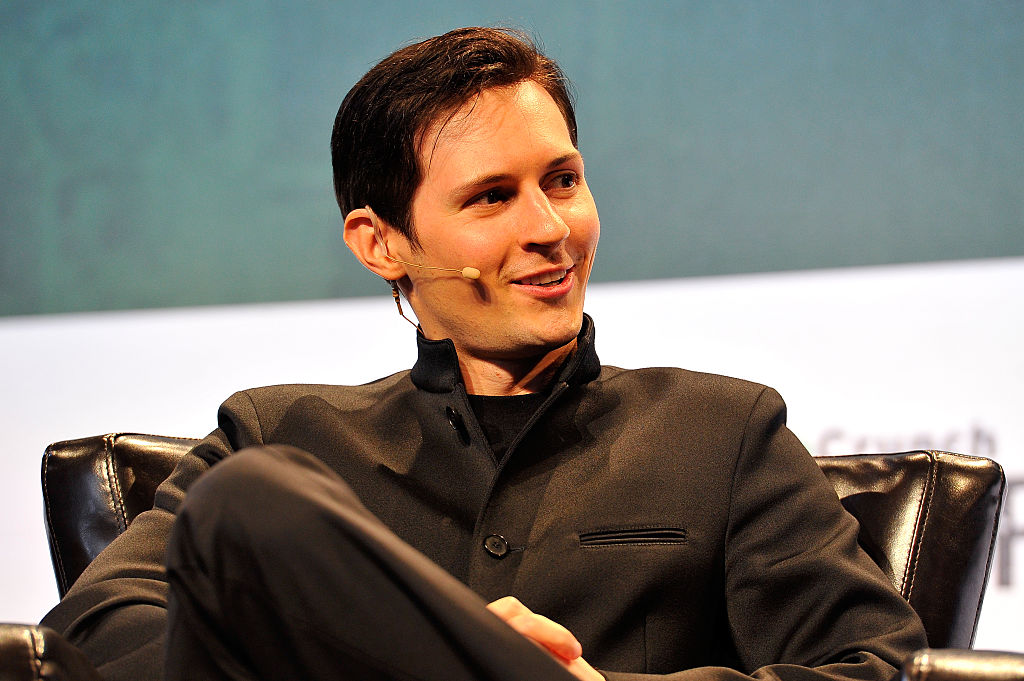Pavel Durov, Russian-born founder of the Telegram messaging and social media app, has been arrested in France for failing to comply with official demands to regulate content posted by users on his app. According to a warrant issued by France’s Ofmin – an office tasked with preventing violence against minors – Durov’s alleged offences include abetting fraud, drug trafficking, cyberbullying, organised crime, child pornography and the promotion of terrorism.
The arrest of the 39-year-old Durov – a French, Saint Kitts and Nevis and United Arab Emirates citizen – is set to become a battle royal between advocates of free speech and those who seek to regulate it. Elon Musk, owner of Twitter, has been among the first to rush to Durov’s defence, tweeting ‘Liberte. Liberte! Liberte?’ as the news broke. Musk also asked why Mark Zuckerberg has not been arrested over the use of Instagram by pedophiles – and answered his own question with the claim that ‘Instagram has a massive child exploitation problem, but no arrest for Zuck, as he censors free speech and gives governments backdoor access to user data… he already caved into censorship pressure.’
In 2018, the Kremlin attempted to shut down access to Telegram in Russia
To many free speech advocates, the arrest of Durov for hosting a platform on which unacceptable things are said feels like a very 20th century solution to a 21st century problem. Indeed, some accuse French authorities of repeating what the Kremlin tried and failed to do in 2014, when the Russian Federal Security Service (FSB) demanded access to the personal data of users of Durov’s earlier social media product, vKontakte, a Russian version of Facebook. Durov resolutely refused, was forced to sell his company to more Kremlin-friendly owners and fled Russia. From his new base in Dubai, Durov founded Telegram as a communication and social media app that would be free of censorship and government interference. Telegram’s 900 million active users ‘love the independence… the privacy, the freedom’ of the platform, Durov told Tucker Carlson in April.
In 2018, the Kremlin attempted to shut down access to Telegram in Russia on the grounds that it was hosting ‘terrorism and extremism’ on the platform. Russian authorities played a months-long game of whack-a-mole by attempting to block servers that hosted Telegram before giving up on the attempt. Now, paradoxically enough, Telegram is used not only by top Russian leaders but also extreme nationalist bloggers and opposition activists. More, the platform is one of the last outlets by which independent media can communicate with supporters in Russia and Belarus – as well as across the former Soviet Union. ‘Telegram has also become the largest resource of information in Ukraine,’ tweeted Iuliia Mendel, Ukrainian President Volodimir Zelensky’s former press secretary who met Durov with her boss. ‘It is [where] Ukrainians get most of their news.’ According to a recent survey, 69 per cent of Russians said that Telegram was also their main source of news – and the platform has over 300 million users in India.
Christo Grozev, whose investigations with the Bellingcat open source intelligence network have helped to expose Kremlin corruption, was also once a staunch supporter of Telegram’s independence – but after Durov’s arrest tweeted that ‘unfortunately, his refusal to cooperate with the FSB in support of freedom of speech has been completely offset by his refusal to cooperate with others [intelligence agencies] to stop the misuse of Telegram for nefarious purposes.’ However, other messaging apps such as Signal – the favoured comms app for the Ukrainian military – have far stronger encryption than Telegram. Indeed, unlike WhatsApp and Signal, Telegram posts and messages are only end-to-end encrypted if users activate that feature manually, and only a tiny fraction do.
Pro-Ukraine bloggers have delighted in the news on the grounds that Telegram is also used for such dark purposes as Russian ultranationalist propaganda and Russian military commanders communications. The Russian government, which itself hounded Durov into exile, has also protested his arrest. ‘He thought his biggest problems were in Russia and left’, former Russian president Dmitry Medvedev wrote on his Telegram channel. ‘He wanted to be a brilliant “citizen of the world,” living well without a homeland… He miscalculated. To our common enemies, he is still Russian – unpredictable and dangerous, of different blood.’
Though Durov – like Elon Musk – has consistently positioned himself as a free speech absolutist, in reality Telegram’s user guidelines ban ‘terrorist content, scams, illegal pornography or the promotion of violence.’ Telegram also removed Isis-linked channels in 2019, and white supremacist groups linked to the storming of the US Capitol building in 2021.
There has been speculation that Durov’s arrest is linked to his most recent trip to Baku, Azerbaijan, where he reportedly attempted to meet with Vladimir Putin during a state visit last week. In recent weeks the Kremlin has begun suppressing access to Youtube and WhatsApp in Russia in the wake of Ukraine’s Kursk incursion. There is speculation that Durov may have been attempting to persuade Putin to leave Telegram alone – but the Russian leader refused to meet him. The fact that Durov flew from Baku to Paris in his private plane, knowing that the French had a longstanding warrant out for his arrest, is one of the unanswered mysteries of this story.
In any case, the France’s arrest of Durov is set to raise some awkward questions. Do the French authorities believe that paedophiles, fascists and Islamists will somehow cease to communicate, or indeed cease to exist, if the founder of Telegram is put in jail? Telegram may not be widely used in the UK, but Durov’s arrest throws current UK free speech debates into sharp focus too. In a supposedly free society, what is the proper relationship between the authorities and internet speech, and who is responsible for policing it?

